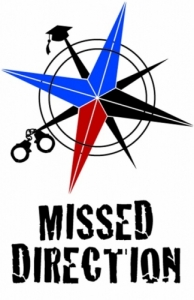Missed Direction: The other choice
By John Joyce and Kenneth Fine
Published in News on September 2, 2013 1:46 PM

Marissa Davis will always be bound to the projects -- to the little girl who peeked around corners to catch a glimpse of card games, drinking and drugs.
She will always be the daughter of a single mother -- of a woman who succumbed to the street life and ended up in jail.
So when the Goldsboro police officer talks about what she
is seeing transpire in the
neighborhoods she has known all her life, her eyes well up faster than when she recounts the events of her own troubled childhood.
"If there was ever a time
that we as a people, everybody, needed some kind of spiritual relationship," she said before her thought gave way to tears.
It's a concept that's difficult for Marissa to face -- the notion that so many children from her block lack the kind of guidance that helped her succeed.
Not many of them have a role model like her grandmother was to her -- a person to shield them from the images of smoke, dancing and gambling she had to sneak around to see.
"If not for that, I don't know where I would be," she said. "I didn't see that type of environment. Children were children and adults were adults."
•
Marissa spent her childhood alongside her grandmother, the woman she characterizes as the "glue" that held her family together.
They cooked, cleaned and did homework, a routine the matriarch designed to instill pride and discipline in all of her grandchildren.
And though her life was far from perfect, Marissa said she was prepared to make the choices necessary to avoid the pitfalls that might have hindered her chances for success.
She didn't want to get "caught up" -- to have to restart her life over and over the way her mother did.
She remembers the day she joined the police force -- before the five years spent as the only black woman on her shift; before she rose to the rank of corporal.
"The chief of police then, he was acting-chief, sat me down and said 'Marissa, you'll never get rich doing this job, but you'll make an honest living, be able to have a good life and be a productive citizen,'" she said.
And ever since that conversation, she has tried, in her own way, to be the type of role model her grandmother was for the children she comes into contact with.
She encourages young girls to surround themselves with positive influences and like-minded friends with goals and desires.
She tells them to escape their environments when they can by going to school when others might skip, or by hanging out at one another's homes when other kids are hanging out on corners.
"Find things that interest you and keep your mind on the right things," she says.
But in a world she sees as material-driven, making the right choices is becoming more and more difficult for young people growing up in the neighborhoods she used to roam.
Today's kids are out in the streets alone -- with no guidance, but with guns and a lack of respect for themselves or for others, not because they don't have pride, but because they aren't shown how to apply it, she said.
"As kids, we were taught pride in ourselves, family, told right from wrong and taught life skills," Marissa said. "We learned to conduct ourselves in stores and how to transact business."
And discipline was a community process.
"Other parents used to be able to correct each other's kids, or report back misbehavior," she said, adding that these days, most people are cautious about what they say for fear of repercussion.
So while she was somewhat sheltered from the dangers lurking on the block, the current generation is hyper-exposed to a broken family dynamic within neighborhoods saturated with guns, drugs and gangs.
"The children suffer," she said.
